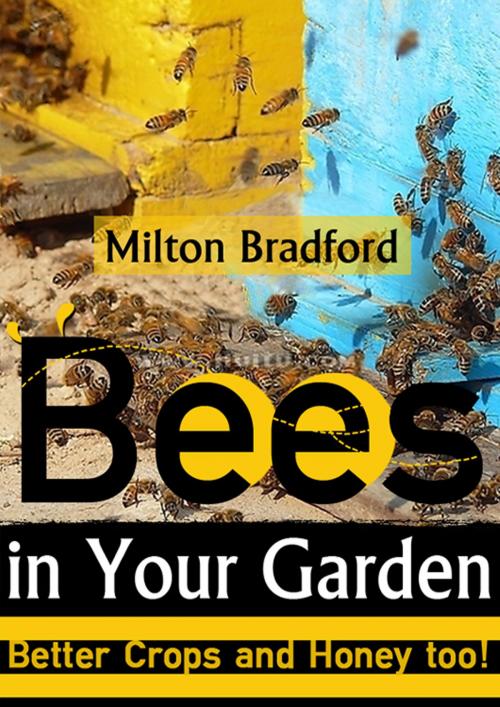| Author: | Milton Bradford | ISBN: | 9781311098054 |
| Publisher: | CPublishing | Publication: | February 5, 2015 |
| Imprint: | Smashwords Edition | Language: | English |
| Author: | Milton Bradford |
| ISBN: | 9781311098054 |
| Publisher: | CPublishing |
| Publication: | February 5, 2015 |
| Imprint: | Smashwords Edition |
| Language: | English |
Think about this. It's a warm, sunny day in the springtime. Imagine yourself lying on your back in a field of grass and clover. As a warm gentle breeze lightly blows across your face, you can hear the sounds of nature all around you.
Puffy white clouds meander slowly across the azure sky. Songbirds call out to one another while teaching their chicks how to fly. You hear the buzzing of the honeybees as they flit from one flower to another going about their daily ritual.
And so begins the trip from the bee to the hive and ultimately to your pantry.
Honey is the by-product of nature's simplest form of manufacturing. The beehive has got to be the most energy efficient industrial facility of all time. The bees that flit by you while you are enjoying your downtime are the most productive and cost effective workers we know.
They don't cost us a penny in wages. They don't cost us any employee benefits. And, they work tirelessly to complete their mission before slowly fading into the sunset happily forfeiting their short lives so we can enjoy their bounty.
It's an all natural process that's been working for thousands of years and not only provides us with a natural, high energy sweetening food source but also gives us benefits for skin care and cough suppressing.
Unfortunately, bee populations are decreasing from a number of factors in most parts of the world. Many gardeners have considered placing a couple of hives in their garden to improve the pollination of their plants and get their own honey at their own doorstep.
If your gardening history has never included the idea of trying your own hand at honey production, you are really missing out on a treat. It's not just improving pollination of your plants or giving you a ready source for your own honey.
No, your endeavors can help to combat the huge challenge of Colony Collapse Disorder (CCD) that plagues every continent in the world.
Why not give it a try? It takes a little bit of time and resources but the rewards are truly outstanding! One of the resources you need is something that tells you what to do in the simplest of terms.
Luckily for you, you've already found it!
Look, you can find a lot of beekeeping information online. And, if you are up to reading textbooks full of all the technical jargon about beekeeping, then by all means go for it! Just be prepared to burn out quickly.
Instead, how about learning about producing from your own hives with a small amount of money, time and effort from someone who does it? We have just the thing for you. Our guide. It's called "Bees In Your Garden."
Our author practices what he teaches you. His words are jam-packed with all the information that you need in a compact but comprehensive form.
Milton shows you exactly what you need to know in plain English. Take a look at what you'll uncover:
- How much time and money it will take to get started.
- Discover what equipment you will need.
- Power up your knowledge about different hives and honey.
- Unearth the secrets to solving problems.
- Find out myths and lies about bees and beekeeping.
- Educate yourself about ways to save time.
Think about this. It's a warm, sunny day in the springtime. Imagine yourself lying on your back in a field of grass and clover. As a warm gentle breeze lightly blows across your face, you can hear the sounds of nature all around you.
Puffy white clouds meander slowly across the azure sky. Songbirds call out to one another while teaching their chicks how to fly. You hear the buzzing of the honeybees as they flit from one flower to another going about their daily ritual.
And so begins the trip from the bee to the hive and ultimately to your pantry.
Honey is the by-product of nature's simplest form of manufacturing. The beehive has got to be the most energy efficient industrial facility of all time. The bees that flit by you while you are enjoying your downtime are the most productive and cost effective workers we know.
They don't cost us a penny in wages. They don't cost us any employee benefits. And, they work tirelessly to complete their mission before slowly fading into the sunset happily forfeiting their short lives so we can enjoy their bounty.
It's an all natural process that's been working for thousands of years and not only provides us with a natural, high energy sweetening food source but also gives us benefits for skin care and cough suppressing.
Unfortunately, bee populations are decreasing from a number of factors in most parts of the world. Many gardeners have considered placing a couple of hives in their garden to improve the pollination of their plants and get their own honey at their own doorstep.
If your gardening history has never included the idea of trying your own hand at honey production, you are really missing out on a treat. It's not just improving pollination of your plants or giving you a ready source for your own honey.
No, your endeavors can help to combat the huge challenge of Colony Collapse Disorder (CCD) that plagues every continent in the world.
Why not give it a try? It takes a little bit of time and resources but the rewards are truly outstanding! One of the resources you need is something that tells you what to do in the simplest of terms.
Luckily for you, you've already found it!
Look, you can find a lot of beekeeping information online. And, if you are up to reading textbooks full of all the technical jargon about beekeeping, then by all means go for it! Just be prepared to burn out quickly.
Instead, how about learning about producing from your own hives with a small amount of money, time and effort from someone who does it? We have just the thing for you. Our guide. It's called "Bees In Your Garden."
Our author practices what he teaches you. His words are jam-packed with all the information that you need in a compact but comprehensive form.
Milton shows you exactly what you need to know in plain English. Take a look at what you'll uncover:
- How much time and money it will take to get started.
- Discover what equipment you will need.
- Power up your knowledge about different hives and honey.
- Unearth the secrets to solving problems.
- Find out myths and lies about bees and beekeeping.
- Educate yourself about ways to save time.















